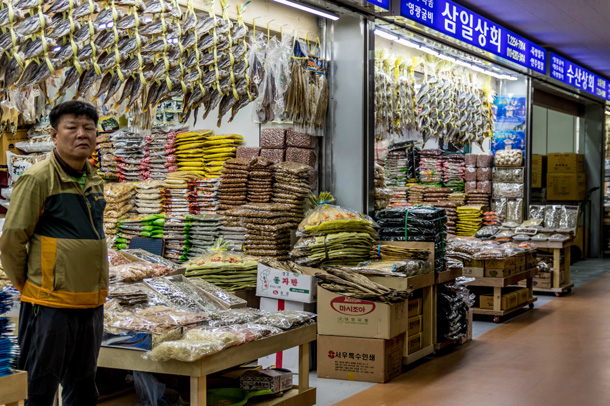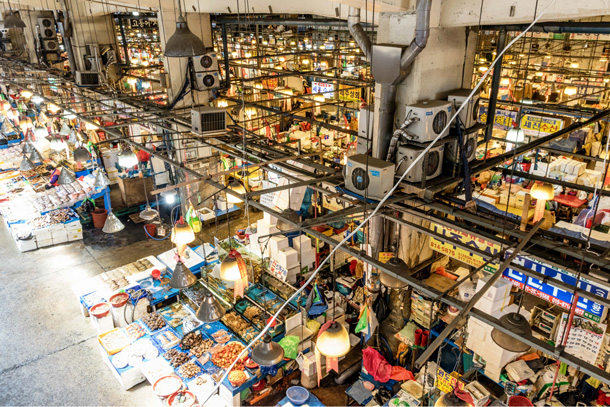
SEOUL – TRAVEL – A battle is raging over where to buy your fish in Seoul, and the outcome will determine the fate of one of the city’s most iconic food markets and tourist destinations.
The sprawling Noryangjin Fish Market, on the south banks of the Han River, has been where fish sellers, buyers and simply the curious have been congregating since 1927. It’s also one of Seoul’s top tourist destinations.
Conan O’Brien visited, and played with the squirting “sea penises” on American TV. A thousand Chinese tourists visit a day, according to Seoul’s Chosun Ilbo newspaper. Fox News rated it the third-best food market in the world, and when Conde Nast Travel ran a photo essay of the best markets in Seoul, 10 of the 20 photos were from Noryangjin.
Battle to remain open

Today, though, the market is quiet. There is graffiti on the top floors that reads “Demolition.” On the main floor, the fish sellers are wearing red vests that read “Together we fight.” Banners hang from the walls, and there is a militant atmosphere throughout the market.
Parent company Suhyup wants the fish sellers to move across the street to a new market. The new market is smaller than the old one, fully indoors and air-conditioned, and resembles a department store. It is also mostly empty, since most fish sellers refuse to move there, despite orders from Suhyup.
“After they built the whole new building, we didn’t get any notice or have any meetings,” said one fish seller, who refused to give his name but has been selling fish at Noryangjin for 30 years. “On March 16, 2016, we got a notice to move. After we checked the new site, we saw it didn’t match our needs, so we chose to stay and fight.”
Mixed reactions to new
Suhyup says the old building, now 45 years old, is unsafe and unsanitary. But fish sellers have a litany of complaints about the new building, chiefly that the allocated lots are too small. They say the floors are slippery (I almost fell twice), the aisles are too narrow, the rents are too high, they weren’t properly consulted and, most important for visitors, that it lacks any of the atmosphere the old building has.
The corporation, meanwhile, says the fish sellers were perfectly well consulted, rents and lot sizes are the same, and everyone signed an agreement to move as far as back as 2009.
“We have to face the fact they’re not going to rebuild the traditional site,” says Song Young-hi, a fish seller of 39 years who reluctantly moved to the new building. She complains the lots are too narrow, and that it’s “almost impossible” to display the fish. Still, she doubts the company will back down, and she has to make a living. “I have to do what I have to do,” she says. The dispute is now with the courts.
Modern, but will tourists come?
A favorite activity among tourists at Noryangjin is getting the fresh seafood cut up right in front of them and served in one of the market’s many restaurants. In the old building, all the restaurants have been shuttered and sprayed with graffiti, their electricity and water shut off by the company. In the new building, the restaurants are open, but with fewer customers.
Stella, a tourist from Toronto who didn’t want to give her last name, bought fish at the new market to eat at one of the second-floor restaurants. But she said she would rather have gone to the old market, and was under the impression the old one was closed.
“My friends showed me pictures of the old one. It seemed to have more choice,” she says.
Traditional-style ‘better’
In the old market, Achuko and Yoko from Japan look at crabs and discuss the two markets. “I like the new market,” Achuko says. “It’s so clean.” But, she adds, “It’s impossible to move all of [the fish sellers] there.”
She admits the old market is more traditional. “The old one is cheaper and a bigger market,” Achuko says. “So Koreans like this style, I think.”
Jang Han Gi is a fish seller who splits a 24-hour shift with his brother. It’s hard work, but after 25 years, he’s used to it. He says there’s no way he’s moving to the new market.
“The customers prefer the open site and the open style of this building,” Jang says.
Jake Yoo, a local tour guide, agrees. He says there just isn’t time to visit both markets on a tour, and the old one wins with tourists, hands-down. “This is traditional-style here, and it’s better.”
Copyright Dave Hazzan via Zester Daily and Reuters Media Express




